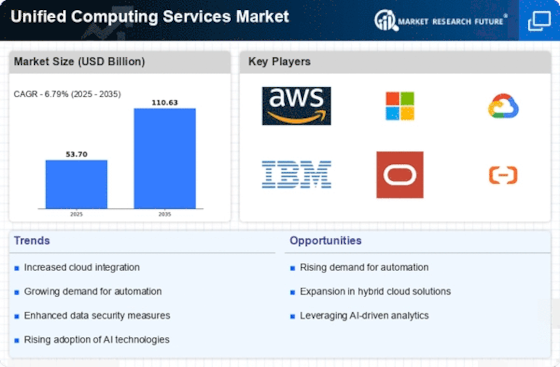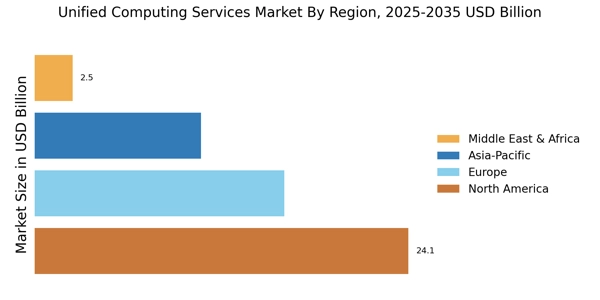Emphasis on Cost Efficiency
Cost efficiency remains a critical driver within the Unified Computing Services Market. Organizations are increasingly pressured to optimize their IT expenditures while maintaining high performance levels. The integration of unified computing solutions allows businesses to consolidate their resources, thereby reducing operational costs associated with managing disparate systems. Recent analyses suggest that companies adopting unified computing frameworks can achieve up to a 30% reduction in total cost of ownership. This financial incentive is compelling, particularly for small to medium-sized enterprises that may lack the resources for extensive IT infrastructure. Consequently, the focus on cost efficiency is prompting service providers to innovate and offer competitive pricing models, further stimulating growth within the Unified Computing Services Market.
Rising Demand for Scalability
The Unified Computing Services Market is experiencing a notable rise in demand for scalable solutions. Organizations are increasingly seeking infrastructure that can adapt to their evolving needs, particularly as data volumes continue to grow. This trend is driven by the necessity for businesses to remain agile and responsive to market changes. According to recent data, the market for scalable computing solutions is projected to expand at a compound annual growth rate of approximately 12% over the next five years. This growth is indicative of a broader shift towards flexible computing environments that can accommodate varying workloads without significant capital investment. As a result, providers in the Unified Computing Services Market are focusing on developing modular architectures that allow for easy scaling, thereby enhancing operational efficiency and reducing costs.
Advancements in Network Technologies
Advancements in network technologies are playing a pivotal role in shaping the Unified Computing Services Market. The emergence of high-speed networking solutions, such as 5G and advanced fiber optics, is enabling faster data transmission and improved connectivity. This technological evolution is crucial for organizations that rely on real-time data access and processing. As network capabilities expand, the demand for unified computing solutions that can effectively utilize these advancements is likely to increase. Recent projections suggest that the market for high-speed networking solutions will grow at a rate of 15% annually over the next few years. Consequently, service providers in the Unified Computing Services Market are focusing on enhancing their offerings to leverage these network advancements, thereby improving overall service delivery and customer satisfaction.
Growing Importance of Data Analytics
The Unified Computing Services Market is increasingly influenced by the growing importance of data analytics. As organizations strive to leverage data for strategic decision-making, the demand for integrated computing solutions that facilitate real-time data processing is surging. This trend is underscored by the fact that businesses utilizing advanced analytics are likely to outperform their competitors by 5 to 6% in productivity. The ability to analyze vast amounts of data efficiently is becoming a key differentiator in various sectors, including finance, healthcare, and retail. Consequently, service providers in the Unified Computing Services Market are investing in technologies that enhance data analytics capabilities, thereby enabling clients to derive actionable insights and drive innovation.
Increased Focus on Hybrid IT Environments
The shift towards hybrid IT environments is a significant driver in the Unified Computing Services Market. Organizations are increasingly adopting a combination of on-premises and cloud-based solutions to optimize their IT strategies. This hybrid approach allows businesses to maintain control over sensitive data while leveraging the scalability and flexibility of cloud services. Recent statistics indicate that nearly 70% of enterprises are expected to adopt hybrid IT models by 2026. This trend is prompting service providers to develop integrated solutions that seamlessly connect on-premises infrastructure with cloud resources. As a result, the Unified Computing Services Market is witnessing a surge in demand for services that facilitate this integration, thereby enhancing operational agility and responsiveness.

















